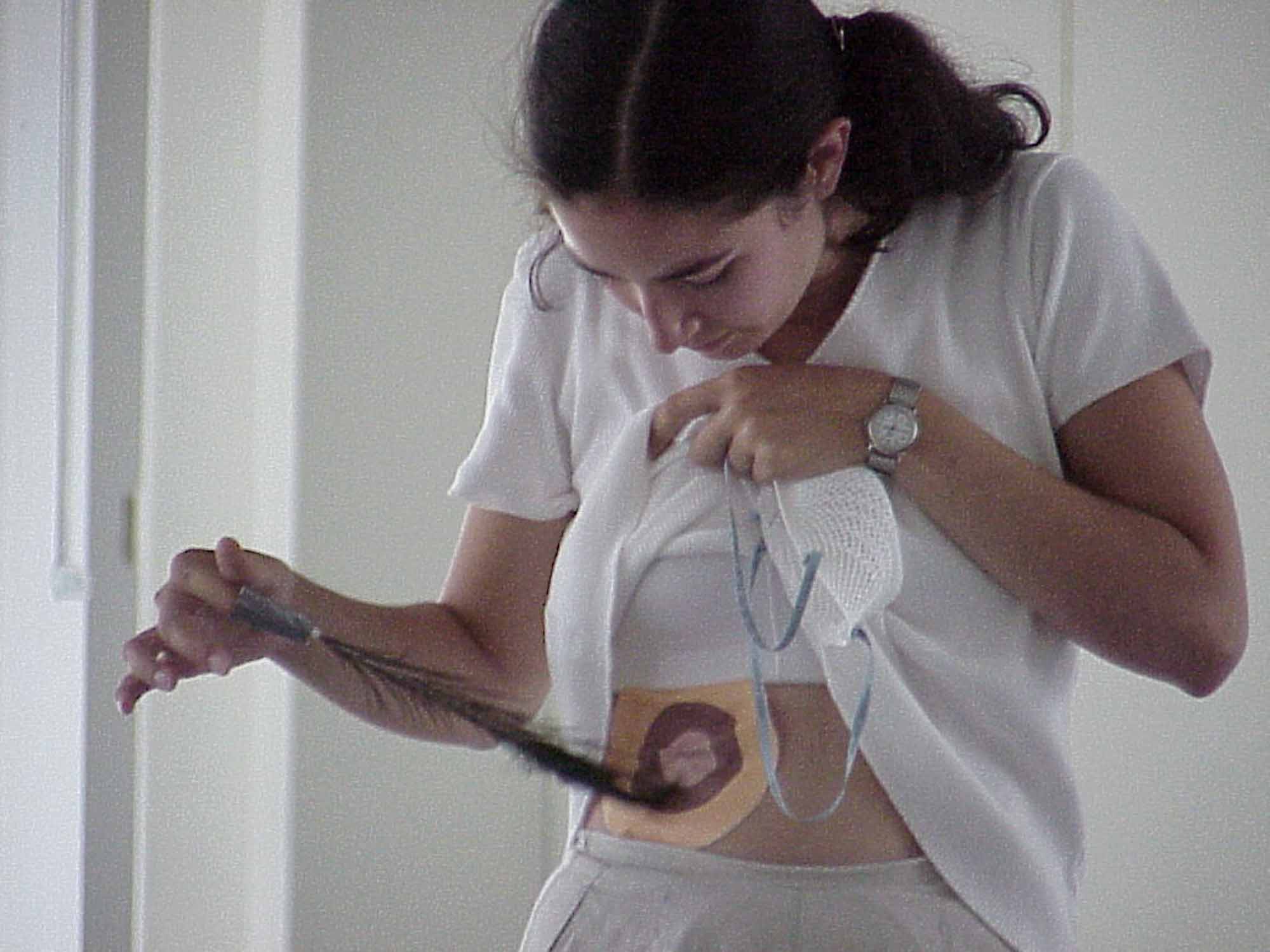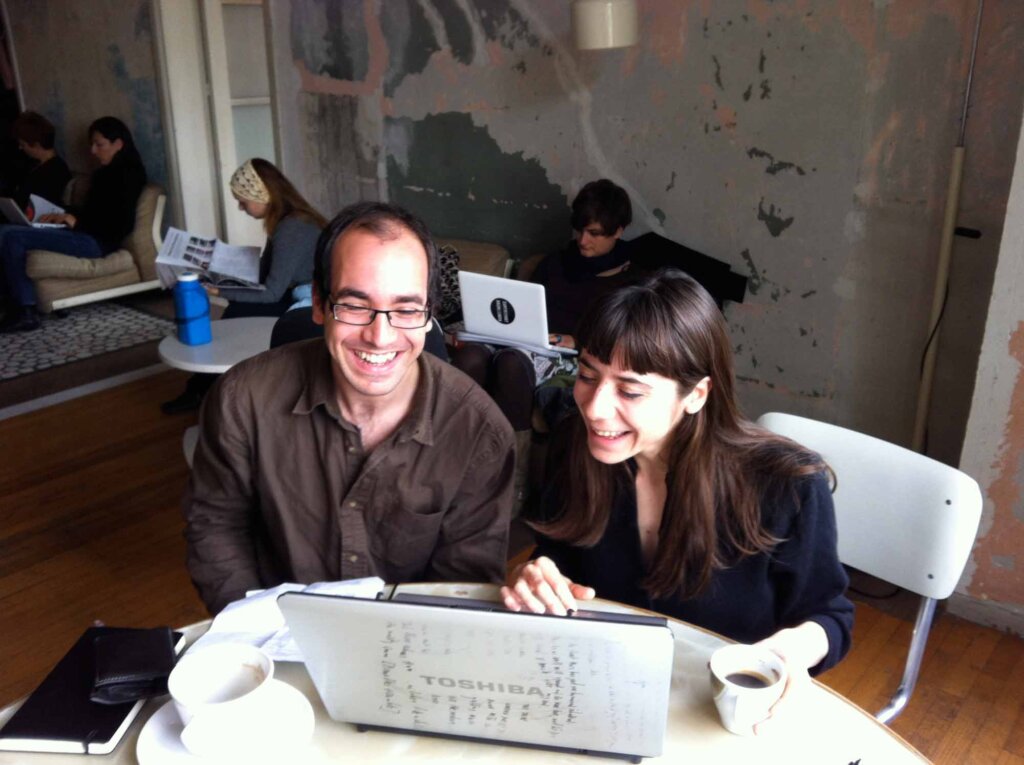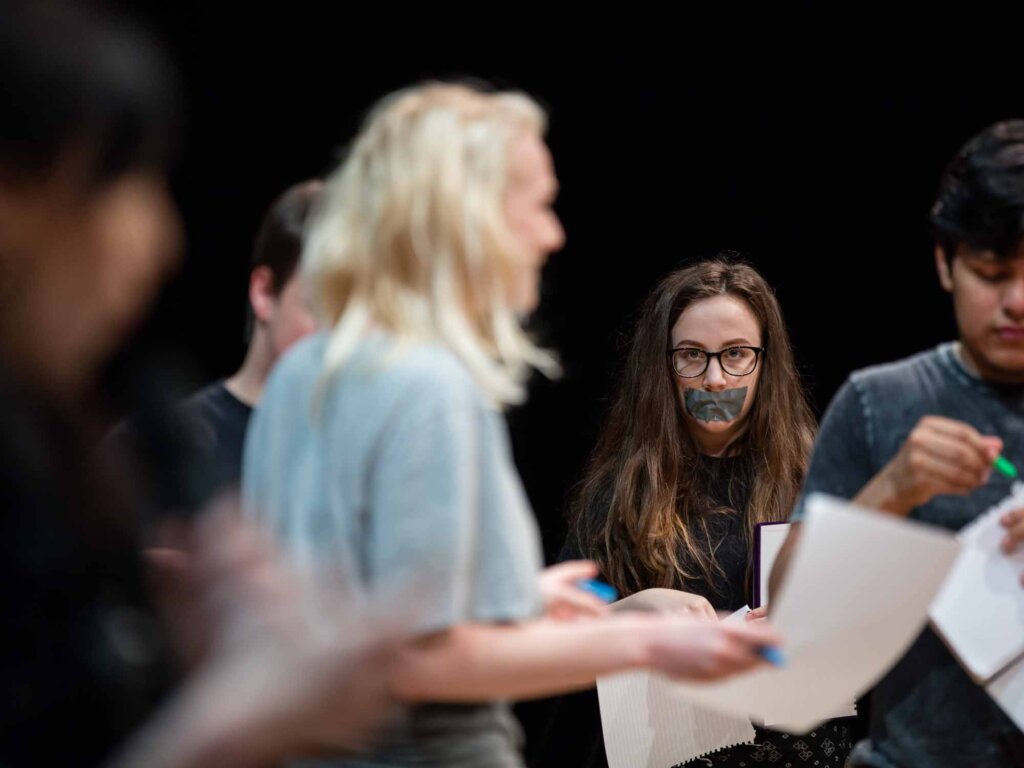
Goat Island Summer Schools
An opportunity for artists to work and study together in a structured creative environment
Goat Island was a Chicago-based collaborative performance group, 1987-2009.
The text below appears in a different form as the introduction to Goat Island’s Schoolbook 2, published in 2002. The book reflects and documents Goat Island’s Summer School process, and its contents fall into two main categories: a workbook section, which includes the projects that instigate the making of work, and the lecture section, which includes texts delivered by visiting artists as well as the members of Goat Island during the course of the workshop. These two sections reflect two aspects of the summer school structure: the practical and the theoretical.
Goat Island performance work is a series of responses: to the exercises we give ourselves, to our surroundings, to the events of the world, but mostly, to each other. We perform responses for each other back and forth. The conversation goes further than were we just talking. At the end of the conversation we have a piece in front of us and it’s ready to show. These conversations take place over a long period of time. As in a chess match, each response is carefully considered. Time, and therefore, dreams and reverie are part of the conversation. These conversations can be two years long. This gives time for a history to grow and for us to interpret it, for distortions to take on their own meaning, their own demands.
The idea of response has become very important to the culture of Goat Island’s workshops and the Goat Island Summer School. The following text refers to the three week Goat Island Summer School, but is also applicable to the company’s shorter workshops.
As each project is performed creative energy is encouraged to gather strength through the process of creative response. Each presentation of work is met with some kind of artistic response: a work of art that could not have existed without the work it is responding to. These responses are individual contributions to a conversation that stretches throughout the weeks of the workshop. In this way work begets more work and all of the work is inextricably linked. This practice destabilizes the boundaries between critical and creative modes in order to enrich them both.
The Goat Island Summer School, directed by the members of Goat Island, aims to provide an opportunity for artists to work and study together in a structured, creative environment. Applications are invited from visual artists (including video, architecture, and other forms of visual/spatial/durational expression), live and performance artists, and music, dance, and theatre practitioners. Disciplines of performance, installation, writing, movement, music, research, publication and documentation are examined in various forms and combinations dictated by the interests of the participants as well as those of the instructors. Sessions combine theory and practice, investigating forms of thought and presentation, styles of collaboration, historical and philosophical perspectives and methods of individual and collective expression and creativity. The emphasis of the Summer School is on the development and encouragement of new theory and practice in art/performance.
Each Summer School takes on a life of its own and this is driven by the specific people involved. The real work goes on between live people who come together to construct a series of agreements to work and communicate with each other in order to make art. The Goat Island Summer School involves moving into action, finding inspiration, and negotiating community.
In the spirit of the Summer School, visiting creative scholars destabilize distinctions between academic paper and personal response, between discourse and dialogue, between reason and art – delivering lecture/performative presentations, creatively responding to participants’ work, and occasionally functioning as artists in residence at the Summer School. These guests have included: Stephen J. Bottoms, Adrian Heathfield, Carol Becker, Peggy Phelan, Charles Garoian, Simon Jones, AL Kennedy, Francis McKee, Carolyne Rye, Lucy Cash (formerly Lucy Baldwyn), Joe Steiff, and Alan Read. In each case, we encouraged the participants to interpret freely the relevance of the guests’ presentations to their own performance work. That relevance may have been direct or indirect, immediate or delayed, but in each case the mode of presentation as well as the material presented, provided ample opportunity for inspiration. In each case we were immensely honored by the participation of these guests. Goat Island has developed an ongoing relationship with many of these guests who continue to bring their insight to the Summer Schools year after year. We hope their words and actions will continue to ring the bells of possibility in widening circles.
Since 1996, Goat Island has led three Summer Schools in Glasgow (Scotland), three in Bristol (England) and four in Chicago (USA). Other workshops have taken place in Dartington, Lancaster, Brighton, Alsager, Zagreb, Hamburg, New York City and other locations. While every group is special we owe particular thanks to the participants and supporters of the first Goat Island Summer School – this was the dream of Mark Waddell who made it come true in July 1996 with the help of the staff of the Centre for Contemporary Arts in Glasgow, Scotland, and funders including the Arts Council of England International Initiatives Fund, the Glasgow City Council Arts Development Fund, the Scottish Arts Council, and the Glasgow City Council. That first Summer School ensured the ones that followed, and we are now able to offer the School in the United States as well as in Britain, its first home. It has taken on, as most creative enterprises do, a life of its own.
More information can be found at: www.goatislandperformance.org
Writing about Goat Island’s Summer Schools can be found in:
Schoolbook 2
Small Acts of Repair: Performance, Ecology and Goat Island, edited by Stephen Bottoms and Matthew Goulish, Routledge
Between 1996 and 2008, Goat Island led Summer Schools in Glasgow (Scotland), Bristol (England) and Chicago (USA).





